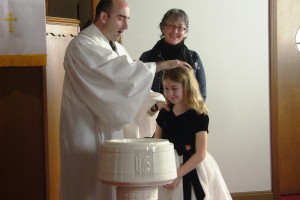A Reformed Understanding of Baptism
What does Scripture have to say about the Sacrament of Baptism?
Baptism is a sign of…
- God’s promise of the Holy Spirit. Acts 2:38
- Participation in Christ’s death and resurrection. Romans 6:1-11, Colossians 2:12
- Conversion, forgiveness, cleansing of sin. Acts 2:32, 22:16, I Corinthians 6:11, Ephesians 5:26
- Initiation into the Body of Christ, the universal Church. I Corinthians 12:12-13
- Pouring out of the Holy Spirit. Titus 3:5, II Corinthians 1:22, Ephesians 1:13
- New birth in Christ. John 3:5
- God’s new kingdom. Galatians 3:27-28, I Corinthians 12:13
- Illumination in Christ. Ephesians 5:8, 14
- Putting on Christ as a new garment. Galatians 3:27, Romans 13:14
- Salvation. I Peter 3:20-22
- Freedom from bondage. I Corinthians 10:1-4
- Ordination: being “set apart” as disciples. Matthew 28:18-20
- Renunciation of evil and affirmation of faith. Hebrews 10:19-23
- Being “branded” as God’s servants. Romans 6:22-23, Galatians 6:17
- Being healed by “troubled water.” John 5:7
| As one can see, the early Church used many images and theological themes to express the meaning of baptism. Our tradition does not state one definitive view but accepts and emphasizes all of these Biblical images.
The early Church placed its importance on the meaning of baptism, not on the act itself. |
 |
Did you know?
- Jesus supposedly never baptized anyone, though he himself was by John the Baptist. Christ’s disciples baptized others.
- Mark 1:10 says: And just as Jesus was coming up out of the water, he saw the heavens torn apart and the Spirit descending like a dove on him. “Coming up out of the water” can certainly mean that he was submerged and then broke surface. It could also mean that he was simply walking up onto the shore. Without being there, we really have no way of knowing for certain.
- Entire households were baptized, which would have included children and servants. Acts 16:14-15, 32-33, I Corinthians 1:13
- Jesus commanded us in Matthew 28:19: Go therefore and make disciples of all nations, baptizing them in the name of the Father and of the Son and of the Holy Spirit. Note the use of the words “all nations,” which means everyone, not just whom we choose.
So why water?
The water of baptism symbolizes the waters of creation, the flood, and the Exodus from Egypt. Also, in his ministry, Jesus likened himself as living water. In all of these, we see the deliverance of God’s people to a new and better way of life. Water is a symbol of liberation.
Regarding all this, we Presbyterians believe:
- Baptism is the sign and seal (assurance) of incorporation into the Body of Christ, the universal Church.
- Baptism unites Christians with each other and with the Church of every time and place.
- Baptism gives the Church its identity and commissions the Church for ministry in the world.
- Baptism signifies the beginning of life in Christ, not its completion. Though it is administered only once, baptism lasts a lifetime (and beyond!).
- Both adult believers and children are included in God’s covenantal love. Baptism, whether administered to those who profess their faith or to children being presented for the sacrament, is one and the same. There is no distinction between the two. We believe the baptism of a six-month-old is just as valid as that of an adult’s and does not need to be redone.
- The baptism of children witnesses to the truth that God’s love claims people before they are able to respond in faith.
- The baptism of those who enter the covenant upon their own profession of faith witnesses to the truth that God’s gift of grace calls for a faithful response.
- The Presbyterian Church (USA) recognizes all Christian baptisms administered with water (sprinkling, pouring, submersion, etc.) in the name of the Father, Son, and Holy Spirit.
- Since baptism is not merely an event but a lifelong process, to “remember our baptism” means to recall our Christian upbringing, whenever that begins, and the saints of the Church who nurtured us along the way.

